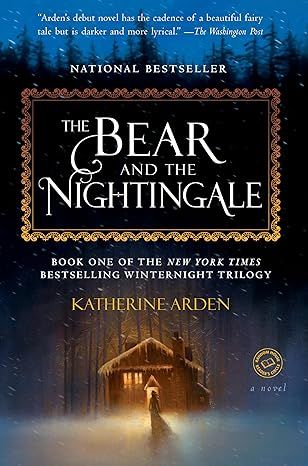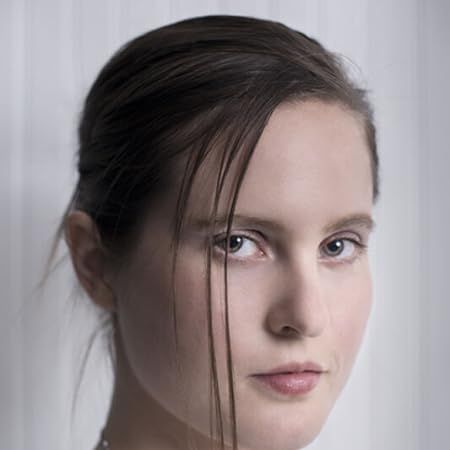The Bear and the Nightingale: A Novel (Winternight Trilogy)
4.4
-
16,897 ratings
Katherine Arden’s bestselling debut novel spins an irresistible spell as it announces the arrival of a singular talent with a gorgeous voice. “A beautiful deep-winter story, full of magic and monsters and the sharp edges of growing up.”—Naomi Novik, bestselling author of Uprooted
Winter lasts most of the year at the edge of the Russian wilderness, and in the long nights, Vasilisa and her siblings love to gather by the fire to listen to their nurse’s fairy tales. Above all, Vasya loves the story of Frost, the blue-eyed winter demon. Wise Russians fear him, for he claims unwary souls, and they honor the spirits that protect their homes from evil.
Then Vasya’s widowed father brings home a new wife from Moscow. Fiercely devout, Vasya’s stepmother forbids her family from honoring their household spirits, but Vasya fears what this may bring. And indeed, misfortune begins to stalk the village.
But Vasya’s stepmother only grows harsher, determined to remake the village to her liking and to groom her rebellious stepdaughter for marriage or a convent. As the village’s defenses weaken and evil from the forest creeps nearer, Vasilisa must call upon dangerous gifts she has long concealed—to protect her family from a threat sprung to life from her nurse’s most frightening tales.
Praise for The Bear and the Nightingale
“Arden’s debut novel has the cadence of a beautiful fairy tale but is darker and more lyrical.”—The Washington Post
“Vasya [is] a clever, stalwart girl determined to forge her own path in a time when women had few choices.”—The Christian Science Monitor
“Stunning . . . will enchant readers from the first page. . . . with an irresistible heroine who wants only to be free of the bonds placed on her gender and claim her own fate.”—Publishers Weekly (starred review)
“Utterly bewitching . . . a lush narrative . . . an immersive, earthy story of folk magic, faith, and hubris, peopled with vivid, dynamic characters, particularly clever, brave Vasya, who outsmarts men and demons alike to save her family.”—Booklist (starred review)
“An extraordinary retelling of a very old tale . . . The Bear and the Nightingale is a wonderfully layered novel of family and the harsh wonders of deep winter magic.”—Robin Hobb
Read more
Kindle
$13.99
Available instantly
Audiobook
$0.00
with membership trial
Hardcover
$16.59
Paperback
$10.39
Ships from
Amazon.com
Payment
Secure transaction
ISBN-10
1101885955
ISBN-13
978-1101885956
Print length
368 pages
Language
English
Publisher
Del Rey
Publication date
June 26, 2017
Dimensions
5.5 x 0.8 x 8.3 inches
Item weight
10.2 ounces
Frequently bought together
Popular highlights in this book
Nothing changes, Vasya. Things are, or they are not. Magic is forgetting that something ever was other than as you willed it.
Highlighted by 1,696 Kindle readers
In Russian, Frost was called Morozko, the demon of winter. But long ago, the people called him Karachun, the death-god. Under that name, he was king of black midwinter who came for bad children and froze them in the night.
Highlighted by 1,207 Kindle readers
You are too attached to things as they are, said Morozko, combing the mare’s withers. He glanced down idly. You must allow things to be what best suits your purpose. And then they will.
Highlighted by 1,163 Kindle readers
Sleep is cousin to death, Vasya, he murmured over her head. And both are mine.
Highlighted by 1,115 Kindle readers
The serving-women muttered that she could tame animals, dream the future, and summon rain.
Highlighted by 831 Kindle readers
Product details
ASIN :
B00X2FDZKW
File size :
10425 KB
Text-to-speech :
Enabled
Screen reader :
Supported
Enhanced typesetting :
Enabled
X-Ray :
Enabled
Word wise :
Enabled
Editorial reviews
“Arden’s debut novel has the cadence of a beautiful fairy tale but is darker and more lyrical.”—The Washington Post
“Vasya [is] a clever, stalwart girl determined to forge her own path in a time when women had few choices.”—The Christian Science Monitor
“Stunning . . . will enchant readers from the first page. . . . with an irresistible heroine who wants only to be free of the bonds placed on her gender and claim her own fate.”—Publishers Weekly (starred review)
“Utterly bewitching . . . a lush narrative . . . an immersive, earthy story of folk magic, faith, and hubris, peopled with vivid, dynamic characters, particularly clever, brave Vasya, who outsmarts men and demons alike to save her family.”—Booklist (starred review)
“Arden’s supple, sumptuous first novel transports the reader to a version of medieval Russia where history and myth coexist.”—Kirkus Reviews (starred review)
“Radiant . . . a darkly magical fairy tale for adults, [but] not just for those who love magic.”—Library Journal
“An extraordinary retelling of a very old tale . . . A Russian setting adds unfamiliar spice to the story of a young woman who does not rebel against the limits of her role in her culture so much as transcend them. The Bear and the Nightingale is a wonderfully layered novel of family and the harsh wonders of deep winter magic.”—Robin Hobb
“A beautiful deep-winter story, full of magic and monsters and the sharp edges of growing up.”—Naomi Novik
“Haunting and lyrical, The Bear and the Nightingale tugs at the heart and quickens the pulse. I can’t wait for Katherine Arden's next book.”—Terry Brooks
“The Bear and the Nightingale is a marvelous trip into an ancient Russia where magic is a part of everyday life.”—Todd McCaffrey
“Enthralling and enchanting—I couldn’t put it down. This is a wondrous book!”—Tamora Pierce
Read more
Sample
It was late winter in northern Rus’, the air sullen with wet that was neither rain nor snow. The brilliant February landscape had given way to the dreary gray of March, and the household of Pyotr Vladimirovich were all sniffling from the damp and thin from six weeks’ fasting on black bread and fermented cabbage. But no one was thinking of chilblains or runny noses, or even, wistfully, of porridge and roast meats, for Dunya was to tell a story.
That evening, the old lady sat in the best place for talking: in the kitchen, on the wooden bench beside the oven. This oven was a massive affair built of fired clay, taller than a man and large enough that all four of Pyotr Vladimirovich’s children could have fit easily inside. The flat top served as a sleeping platform; its innards cooked their food, heated their kitchen, and made steam-baths for the sick.
“What tale will you have tonight?” Dunya inquired, enjoying the fire at her back. Pyotr’s children sat before her, perched on stools. They all loved stories, even the second son, Sasha, who was a self-consciously devout child, and would have insisted—had anyone asked him—that he preferred to pass the evening in prayer. But the church was cold, the sleet outside unrelenting. Sasha had thrust his head out-of-doors, gotten a faceful of wet, and retired, vanquished, to a stool a little apart from the others, where he sat affecting an expression of pious indifference.
The others set up a clamor on hearing Dunya’s question: “Finist the Falcon!”
“Ivan and the Gray Wolf!” “Firebird! Firebird!”
Little Alyosha stood on his stool and waved his arms, the better to be heard over his bigger siblings, and Pyotr’s boarhound raised its big, scarred head at the commotion.
But before Dunya could answer, the outer door clattered open and there came a roar from the storm without. A woman appeared in the doorway, shaking the wet from her long hair. Her face glowed with the chill, but she was thinner than even her children; the fire cast shadows in the hollows of cheek and throat and temple. Her deep-set eyes threw back the firelight. She stooped and seized Alyosha in her arms.
The child squealed in delight. “Mother!” he cried. “Matyushka!” Marina Ivanovna sank onto her stool, drawing it nearer the blaze.
Alyosha, still clasped in her arms, wound both fists around her braid. She trembled, though it was not obvious under her heavy clothes. “Pray the wretched ewe delivers tonight,” she said. “Otherwise I fear we shall never see your father again. Are you telling stories, Dunya?”
“If we might have quiet,” said the old lady tartly. She had been Marina’s nurse, too, long ago.
“I’ll have a story,” said Marina at once. Her tone was light, but her eyes were dark. Dunya gave her a sharp glance. The wind sobbed outside. “Tell the story of Frost, Dunyashka. Tell us of the frost-demon, the winter-king Karachun. He is abroad tonight, and angry at the thaw.”
Dunya hesitated. The elder children looked at each other. In Russian, Frost was called Morozko, the demon of winter. But long ago, the people called him Karachun, the death-god. Under that name, he was king of black midwinter who came for bad children and froze them in the night. It was an ill-omened word, and unlucky to speak it while he still held the land in his grip. Marina was holding her son very tightly. Alyosha squirmed and tugged his mother’s braid.
“Very well,” said Dunya after a moment’s hesitation. “I shall tell the story of Morozko, of his kindness and his cruelty.” She put a slight emphasis on this name: the safe name that could not bring them ill luck. Marina smiled sardonically and untangled her son’s hands. None of the others made any protest, though the story of Frost was an old tale, and they had all heard it many times before. In Dunya’s rich, precise voice it could not fail to delight.
“In a certain princedom—” began Dunya. She paused and fixed a quelling eye upon Alyosha, who was squealing like a bat and bouncing in his mother’s arms.
“Hush,” said Marina, and handed him the end of her braid again to play with.
“In a certain princedom,” the old lady repeated, with dignity, “there lived a peasant who had a beautiful daughter.”
“Whasser name?” mumbled Alyosha. He was old enough to test the authenticity of fairy tales by seeking precise details from the tellers.
“Her name was Marfa,” said the old lady. “Little Marfa. And she was beautiful as sunshine in June, and brave and good-hearted besides. But Marfa had no mother; her own had died when she was an infant. Although her father had remarried, Marfa was still as motherless as any orphan could be. For while Marfa’s stepmother was quite a handsome woman, they say, and she made delicious cakes, wove fine cloth, and brewed rich kvas, her heart was cold and cruel. She hated Marfa for the girl’s beauty and goodness, favoring instead her own ugly, lazy daughter in all things. First the woman tried to make Marfa ugly in turn by giving her all the hardest work in the house, so that her hands would be twisted, her back bent, and her face lined. But Marfa was a strong girl, and perhaps possessed a bit of magic, for she did all her work un- complainingly and went on growing lovelier and lovelier as the years passed.
“So the stepmother—” seeing Alyosha’s open mouth, Dunya added, “—Darya Nikolaevna was her name—finding she could not make Marfa hard or ugly, schemed to rid herself of the girl once and for all. Thus, one day at midwinter, Darya turned to her husband and said, ‘Husband, I believe it is time for our Marfa to be wed.’
“Marfa was in the izba cooking pancakes. She looked at her step- mother with astonished joy, for the lady had never taken an interest in her, except to find fault. But her delight quickly turned to dismay.
“ ‘—And I have just the husband for her. Load her into the sledge and take her into the forest. We shall wed her to Morozko, the lord of winter. Can any maiden ask for a finer or richer bridegroom? Why, he is master of the white snow, the black firs, and the silver frost!’
“The husband—his name was Boris Borisovich—stared in horror at his wife. Boris loved his daughter, after all, and the cold embrace of the winter god is not for mortal maidens. But perhaps Darya had a bit of magic of her own, for her husband could refuse her nothing. Weeping, he loaded his daughter into the sledge, drove her deep into the forest, and left her at the foot of a fir tree.
“Long the girl sat alone, and she shivered and shook and grew colder and colder. At length, she heard a great clattering and snapping. She looked up to behold Frost himself coming toward her, leaping among the trees and snapping his fingers.”
“But what did he look like?” Olga demanded.
Dunya shrugged. “As to that, no two tellers agree. Some say he is naught but a cold, crackling breeze whispering among the firs. Others say he is an old man in a sledge, with bright eyes and cold hands. Others say he is like a warrior in his prime, but robed all in white, with weapons of ice. No one knows. But something came to Marfa as she sat there; an icy blast whipped around her face, and she grew colder than ever. And then Frost spoke to her, in the voice of the winter wind and the falling snow:
“ ‘Are you quite warm, my beauty?’
“Marfa was a well-brought-up girl who bore her troubles uncomplainingly, so she replied, ‘Quite warm, thank you, dear Lord Frost.’ At this, the demon laughed, and as he did, the wind blew harder than ever. All the trees groaned above their heads. Frost asked again, ‘And now? Warm enough, sweetheart?’ Marfa, though she could barely speak from the cold, again replied, ‘Warm, I am warm, thank you.’ Now it was a storm that raged overhead; the wind howled and gnashed its teeth until poor Marfa was certain it would tear the skin from her bones. But Frost was not laughing now, and when he asked a third time: ‘Warm, my darling?’ she answered, forcing the words between frozen lips as blackness danced before her eyes, ‘Yes . . . warm. I am warm, my Lord Frost.’
“Then he was filled with admiration for her courage and took pity on her plight. He wrapped her in his own robe of blue brocade and laid her in his sledge. When he drove out of the forest and left the girl by her own front door, she was still wrapped in the magnificent robe and bore also a chest of gems and gold and silver ornaments. Marfa’s father wept with joy to see the girl once more, but Darya and her daughter were furious to see Marfa so richly clad and radiant, with a prince ’s ransom at her side. So Darya turned to her husband and said, ‘Husband, quickly! Take my daughter Liza up in your sledge. The gifts that Frost has given Marfa are nothing to what he will give my girl!’
“Though in his heart Boris protested all this folly, he took Liza up in his sledge. The girl was wearing her finest gown and wrapped in heavy fur robes. Her father took her deep into the woods and left her beneath the same fir tree. Liza in turn sat a long time. She had begun to grow very cold, despite her furs, when at last Frost came through the trees, cracking his fingers and laughing to himself. He danced right up to Liza and breathed into her face, and his breath was the wind out of the north that freezes skin to bone. He smiled and asked, ‘Warm enough, darling?’ Liza, shuddering, answered, ‘Of course not, you fool! Can you not see that I am near perished with cold?’
“The wind blew harder than ever, howling about them in great, tearing gusts. Over the din he asked, ‘And now? Quite warm?’ The girl shrieked back, ‘But no, idiot! I am frozen! I have never been colder in my life! I am waiting for my bridegroom Frost, but the oaf hasn’t come.’ Hearing this, Frost’s eyes grew hard as adamant; he laid his fingers on her throat, leaned forward, and whispered into the girl’s ear, ‘Warm now, my pigeon?’ But the girl could not answer, for she had died when he touched her and lay frozen in the snow.
“At home, Darya waited, pacing back and forth. ‘Two chests of gold at least,’ she said, rubbing her hands. ‘A wedding-dress of silk velvet and bridal-blankets of the finest wool.’ Her husband said nothing. The shadows began to lengthen and there was still no sign of her daughter. At length, Darya sent her husband out to retrieve the girl, admonishing him to have care with the chests of treasure. But when Boris reached the tree where he had left his daughter that morning, there was no treasure at all: only the girl herself, lying dead in the snow. “With a heavy heart, the man lifted her in his arms and bore her back home. The mother ran out to meet them. ‘Liza,’ she called. ‘My love!’
“Then she saw the corpse of her child, huddled up in the bottom of the sledge. At that moment, the finger of Frost touched Darya’s heart, too, and she fell dead on the spot.”
There was a small, appreciative silence.
Then Olga spoke up plaintively. “But what happened to Marfa? Did she marry him? King Frost?”
“Cold embrace, indeed,” Kolya muttered to no one in particular, grinning.
Dunya gave him an austere look, but did not deign to reply.
“Well, no, Olya,” she said to the girl. “I shouldn’t think so. What use does Winter have for a mortal maiden? More likely she married a rich peasant, and brought him the largest dowry in all Rus’.”
Olga looked ready to protest this unromantic conclusion, but Dunya had already risen with a creaking of bones, eager to retire. The top of the oven was large as a great bed, and the old and the young and the sick slept upon it. Dunya made her bed there with Alyosha.
The others kissed their mother and slipped away. At last Marina herself rose. Despite her winter clothes, Dunya saw anew how thin she had grown, and it smote the old lady’s heart. It will soon be spring, she comforted herself. The woods will turn green and the beasts give rich milk. I will make her pie with eggs and curds and pheasant, and the sun will make her well again.
But the look in Marina’s eyes filled the old nurse with foreboding.
Read more
About the authors
Katherine Arden
Born in Austin, Texas, Katherine Arden spent her junior year of high school in Rennes, France.
Following her acceptance to Middlebury College in Vermont, she deferred enrolment for a year in order to live and study in Moscow. At Middlebury, she specialized in French and Russian literature.
After receiving her BA, she moved to Maui, Hawaii, working every kind of odd job imaginable, from grant writing and making crêpes to serving as a personal tour guide. After a year on the island, she moved to Briançon, France, and spent nine months teaching. She then returned to Maui, stayed for nearly a year, then left again to wander. Currently she lives in Vermont, but really, you never know.
She is the author of The Bear and the Nightingale.
Read more
Reviews
Customer reviews
4.4 out of 5
16,897 global ratings
shae
5
This is such a great book!!!
Reviewed in the United States on July 3, 2024
Verified Purchase
After I listened to the audio book, I told my kids about the story and my son's gf was very interested so I bought this for her. She fell in love with the story as well. The book is well made and arrived quickly. I am pleased with the purchase.
Out of this World Reviews
5
Historical fantasy fiction at its best. A must-read!
Reviewed in the United States on November 24, 2017
Verified Purchase
The Bear and the Nightingale by Katherine Arden is very much a story in the Uprooted vein. At its simplest, we have a rebellious daughter with hidden talents who must align herself with mythological, dubious intentioned entities else lose the lives of her family, her people, and quite possibly her very way of life. At its simplest, that is the story Arden has crafted, but The Bear and the Nightingale is so much more than that simple synopsis. Set in a rich world full of tradition, politics, and magic, the author strikes the perfect balance between nuanced, vibrant characters with complex motives and personalities and a plot that continuously moves forward.
Vasilisa Petrovna’s birth is marked by death when her mother dies giving her life. Her mother, Marina, who is possessed of special gifts, knows Vasilisa, or Vasya, will be her last child and that she will not survive the ordeal, but she gives birth to her daughter anyway because she knows the gifts Vasya will bring into the world will be even greater than her own. Vasya is raised a wild child. Not because of her father’s lack of tutelage but because she is a creature that will not be controlled. Often she slips into the woods on her own, walking the forest paths and meeting the mythological dwellers there that only she can see. On one such walk she comes upon a great tree and a one-eyed man sleeping at its base. The man is no man at all, but a demon who slumbers now but is slowly waking. Once he does wake, he promises “everlasting life” to any who follow him. His offer is not what it may seem, of course, and so Vasya finds herself in opposition to the waking demon.
Vasya is a headstrong woman in a world where such initiative is not often desired nor praised unless such person is a man. But Konstantin, Vasya’s daughter, is an understanding man who knows his daughter’s fire comes from her mother. I liked Konstantin a lot. He is very much walking a line of his own between the traditional world he lives in and a more progressive one where he sees his daughter’s wild spirit free to do as she pleases. The times when he considers his Vasya toiling over a hot stove and seeing to her children and husband’s needs he is stricken with a heavy heart, for he knows the great potential Vasya possesses would be wasted on such a life. At the very end, Konstantin knows what he has to do to set his daughter free forever; his love for her is strong enough that he never hesitates.
There are many other interesting characters: a priest whose story takes an unforeseen turn when he meets Vasya, a stepmother who embodies much of the atypical stepmother role so often seen in fairy tales, and an ensemble of brothers and sisters who are mostly supportive. Then there are the creatures whom only Vasya can see: vodianoy, vazila, upyrs aplenty, rusalka, and the brothers who are demons whom the real story revolves around. I’ll refrain from delving too much into any one of these, especially the brothers, for fear of giving something away, but suffice to say that the brothers are opposed to one another and Vasya finds herself caught in the middle.
Of the world Arden has built for her novel all I can say is very well done. Set in the world of Rus’, it is very much a Russia that may have existed to some degree but many aspects only in folklore. Still, it is a beautiful depiction of a deep winter world where families huddle together around their oven to sleep and stay warm and where the coming snow cuts off entirely the rural community Vasya calls home from the rest of the world.
The Bear and the Nightingale is historical fantasy fiction at its best. A vibrant world, rich characters, more than a hint of the supernatural, and an endearing main character who doesn’t have all the answers but isn’t afraid to find them makes this a must-read. Vasya’s story continues in The Girl in the Tower. It’s already on my reading list.
Read more
7 people found this helpful
Josh Mauthe
5
Part tale of magic, part historical fiction, part coming of age - all wondrous, magical, and captivating
Reviewed in the United States on January 9, 2018
Verified Purchase
There is an art, I think, to writing about magic. To have a story that features magic is one thing; to have that magic feel truly, well, magical, is a whole other thing. Having characters able to do wondrous, incredible feats of supernatural ability is all well and good, but the best books about magic make it feel truly remarkable and powerful, like something primal and incomprehensible that we are on the verge of comprehending. Susanna Clarke’s Jonathan Strange and Mr. Norrell does this, as do many of the works of Neil Gaiman; Lev Grossman’s The Magicians often does as well.
And now, onto that short list, I can add The Bear and the Nightingale, a captivating, haunting, moody, enchanting debut novel by Katherine Arden, who blends Russian folklore and fairytales with a historical novel, and creates something truly remarkable – a blending of fantasy and coming-of-age novels, a reflection of how the growth of Christianity covered up ancient beliefs, a ground-level view of history, and most of all, a fantastic story that swept me into its rich world and left me hungry for more.
In some ways, The Bear and the Nightingale is a rich meal that should be savored, letting its pleasures reveal themselves over time, so I won’t say much about the plot other than the basic setup: that the book is set in medieval Russia; that it follows a rural family with connections to the Royal Prince of Russia; that its focus is the family’s youngest daughter, whose love of the natural world – and the folkloric creatures who inhabit it – is leading to her independent and willful spirit, which may not bode well for her future as a dutiful wife. How the story becomes something more ambitious – a parable for the replacement of myth with religion, how the magic of nature and history begins to manifest itself, how the old gods begin to awaken…I’ll leave that for you to discover on your own.
What I will tell you that The Bear and the Nightingale is a dazzling mix of fairy tale, coming of age tale, and historical fiction, one that blends the three effortlessly and in a constantly exciting, unpredictable fashion. Arden’s prose is luminous, feeling both like a translated Russian fairy tale and something more poetic and beautiful, finding the beauty of snow-swept forests and of forgotten gods, of frozen rivers and religious icons. More than that, she brings her characters to rich life, letting all of them thrive in their complexity. Each trades off of archetypal roles – there’s even a wicked stepmother, to say nothing of a strict priest who finds witchcraft at a glance – but Arden refuses to let any of them be so simple, giving even her villains pathos, depth, and sympathy.
Most excitingly, though, Arden makes her story feel thrillingly alive in every single way, from the awe inspired by magic to the immersion in folklore, from the complicated personal relationships to the details that bring medieval Russia to life. The Bear and the Nightingale is my favorite kind of book – one that feels so immersive that taking a break from its story feels like a shock to the system, as you’re thrown out of Arden’s world and back to our reality. (Reading a book about the frozen woods of Russia in the middle of an icy cold winter? Even better for the immersion.)
I truly loved this book; maybe there’s no more obvious tell of this than the fact that, as soon as I finished the final page, I immediately ordered book two in the series and began it without even taking a break. And I already know that having to wait a few months for book 3 will be excruciating. It’s wonderful fantasy, immersive history, and a brilliant story of a young girl keeping the spirit of her homeland alive, even before it was a homeland. I loved it, and am excited that this is only the beginning of Arden’s career.
P.S. How refreshing is it to get a fantasy novel, especially one that’s part of a trilogy, that serves as an entirely self-contained story, with a true ending all of its own, even if the story continues? What a treat, especially in this age of endless series without a conclusion ever in sight.
Read more
10 people found this helpful
Top Katherine Arden titles
View all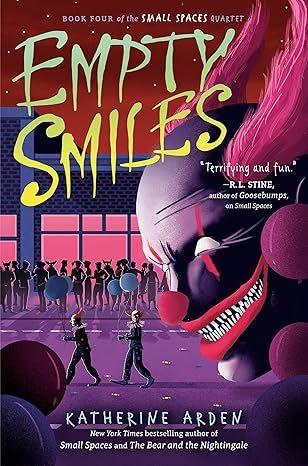
Empty Smiles (Small Spaces Quartet)
4.5
-
514
$8.81
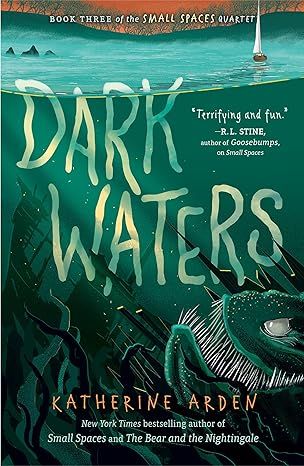
Dark Waters (Small Spaces Quartet)
4.5
-
702
$2.99
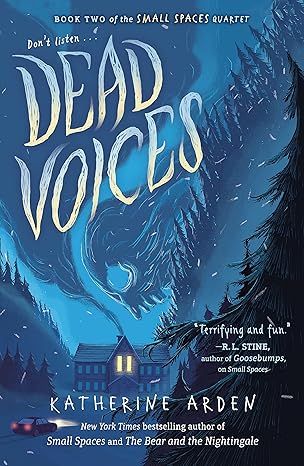
Dead Voices (Small Spaces Quartet)
4.6
-
1,279
$2.99
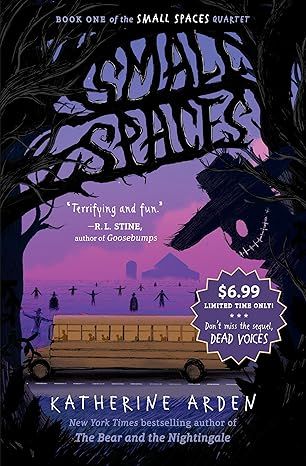
Small Spaces (Small Spaces Quartet)
4.6
-
2,480
$4.99
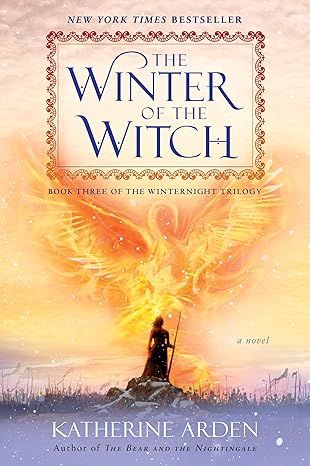
The Winter of The Witch
4.7
-
8,459
$12.95
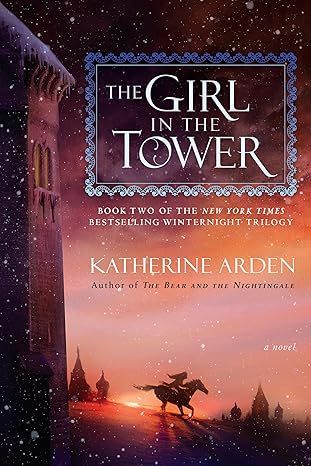
The Girl in the Tower: A Novel (Winternight Trilogy)
4.6
-
9,947
$12.99
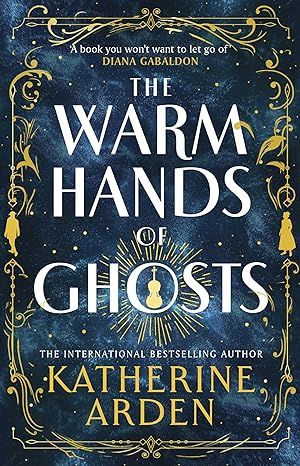
The Warm Hands of Ghosts
4.3
-
1,167
$13.99
Similar Books
Best sellers
View all
The Tuscan Child
4.2
-
100,022
$8.39

The Thursday Murder Club: A Novel (A Thursday Murder Club Mystery)
4.3
-
155,575
$6.33

Sapiens: A Brief History of Humankind
4.6
-
140,302
$13.49

The Butterfly Garden (The Collector, 1)
4.3
-
88,556
$9.59

Things We Hide from the Light (Knockemout Series, 2)
4.4
-
94,890
$11.66

The Last Thing He Told Me: A Novel
4.3
-
154,085
$2.99

The Perfect Marriage: A Completely Gripping Psychological Suspense
4.3
-
143,196
$9.47

The Coworker
4.1
-
80,003
$13.48

First Lie Wins: A Novel (Random House Large Print)
4.3
-
54,062
$14.99

Mile High (Windy City Series Book 1)
4.4
-
59,745
$16.19

Layla
4.2
-
107,613
$8.99

The Locked Door
4.4
-
94,673
$8.53
